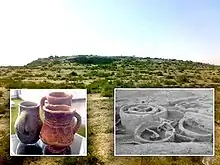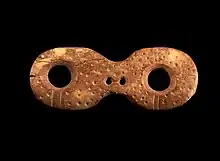Yanik Tepe
Yanik Tepe (Persian: یانیق تپه) is a Chalcolithic and Bronze Age archaeological site in East Azarbaijan, Iran.
یانیق تپه | |
 | |
| Alternative name | قره تپه |
|---|---|
| Location | Tazeh Kand |
| Region | Khosrowshah District East Azarbaijan |
| Type | Tell |
| History | |
| Founded | ca. 4,000–3,000 BC |
| Periods | Chalcolithic, Bronze Age |
| Site notes | |
| Excavation dates | 1958–1959 |
| Archaeologists | Charles A. Burney |
| Condition | Iran National registration number: 4170 |
Site description
The site is located in Tabriz city in iran, east of Lake Urmia and about 30 kilometres southwest of the city of Tabriz.[1].
Yanik Tepe is a relatively large tell (8 hectares) which rises 16.6 metres above the surrounding plain. It is one of the main protohistoric sites excavated in the region after the Second World War, along with (Geoy Tepe) and Haftavan Tepe. Excavations at Yanik Tepe were conducted by Charles A. Burney from 1960 to 1962.[2] His excavations revealed a sequence spanning the Chalcolithic (4th millennium BC) to the Early Bronze Age (3rd millennium BC).
The Early Transcaucasian II-III culture flourished around the northern half of the Lake Urmia basin during the 3rd millennium BC. Yanik Tepe is one of the sites that yield clear evidence for this culture.[3]
Bone object

A bone object found in the Bronze Age layers of the site was originally interpreted by Burney as an amulet. In 2011, ophthalmologist Sahihi Oskooei claimed that it was instead the world's oldest eyewear, made to correct optical problems.[4] Similar objects have been found in excavations at Çatalhöyük, where they may have been used as belt hooks.[5]
References
- C. A. Burney, 1961. “Excavations at Yanik Tepe, North-west Iran,” Iran 23, pp. 138-53.
- Burney, C. A. (1964). The excavations at Yanik Tepe, Azerbaijan, 1962: third preliminary report. Iraq, 26(1), 54-61.
- C. A. Burney, 1962. “Excavation at Yanik Tepe, iran, 1961,” Iran 24, 1962, pp. 134-52.
- Oskooei et al 2011. An Ophthalmological Study of Fourth Millennium BC eye wears from Iranian and World Museums, Pazhoohandeh 7(85): 356-367.
- Russell, N. (1995). Çatalhöyük worked bone. Changing materialities at Çatalhöyük: Reports from the, 1999, 339-368.